Part 14: XIV. Martin II, Baldwin VII, Laurence I 1399-1453 A.D.
The first worry of many was what a Regency Council might do to the Kingdom. In many kingdoms the nobility would seek to grab more power for themselves while a defenseless child sat on the throne. But the young Martin II was known to be a bold and valorous young lad. He quickly earned the admiration of his vassals. They saw his father in him, and his father had brought the Kingdom many decades of peace and prosperity.
Indeed, the coffers of the Kingdom sat at over 86,000 gold. So much money in fact, that the King could scarcely spend it, even if he had wished to. Some vassals, were in fact, skeptical of the young boy King, but with the help of his mother, the Regent Queen Gerberga, and several thousand gold, these skeptics were soon shown the light.
Many, in fact, date the beginning of the reign of Martin II as the beginning of the 'Pax Jerusalem'. The plague had, largely, receded, Islam had waned, and the Kingdom was rich, peaceful, and prosperous. Indeed, it is a period often glossed over in histories of Jerusalem, because there were no great wars, intrigues, villains, disasters, or triumphs. Those would come later...
Still, to those who lived through it, it was a very good time indeed.
Many of King Martin's vassals wished to partake more fully of the Kingdom's prosperity by taxing the peasants more harshly, but the boy forbade it, insisting on fair play and honesty for all his subjects.
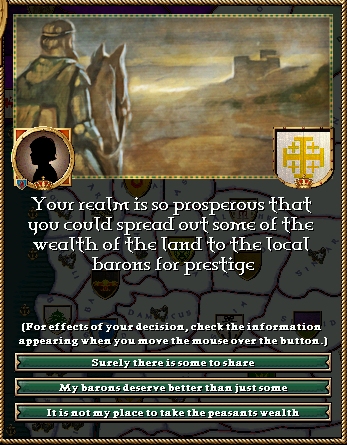
His childhood passed peacefully. Although many still held a secret dread of some disaster, revolt, or power hungry Regents, such things never came to pass. Martin II reached his majority in 1405.
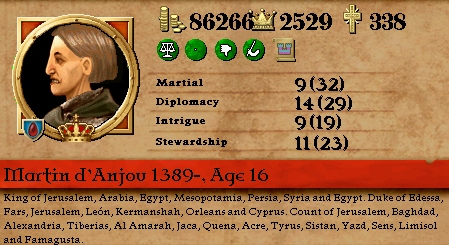
A bride was found for him from the Duchy of Arabia.
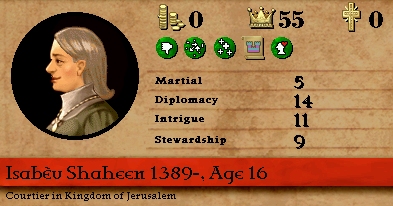
The Kingdom gloried in the wedding of the two young lovers. All Jerusalem was decked in finery and many pilgrims and visitors came from across Europe to pay homage to the bold and handsome young King.
But not all Kingdoms were so fortunate. As if, in a demonstration of the fate Jerusalem had avoided, the Byzantine Empire began a slow slide into chaos. One by one, Byzantine vassals began to break away. They too were ruled by a boy Emperor, one whose name would only ever be spoken of as a curse in later years. The boy who lost Byzantium.
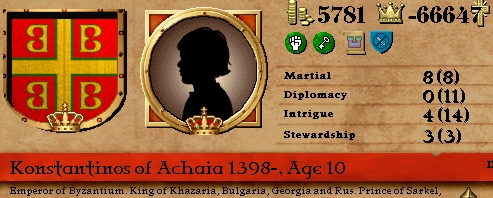
King Martin II took the opportunity to seize the county of Lut, in Persia, when it went independent. Shortly thereafter he took Tabaristan as well.
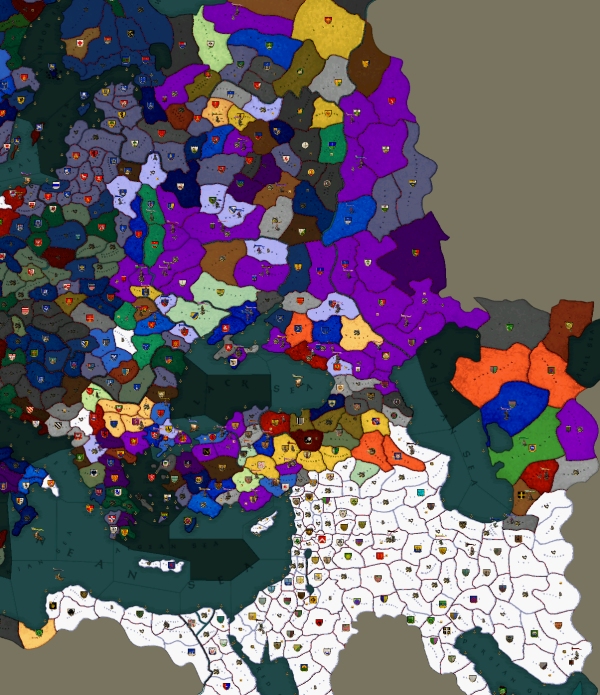
The submission of Persia before Christ, was, for all intents and purposes, complete.
In 1410 a famous monk came to Jerusalem asking permission of King Martin to compile a great chronicle of the history of the House d'Anjou and the Kings of Jerusalem. Martin gave the man his blessing.
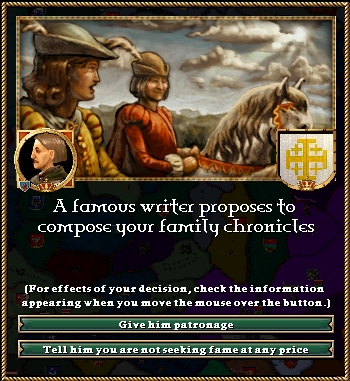
In the north, meanwhile, the Kingdom of Rum who had, long ago, broken away from Byzantium in central Anatolia, now began to grow at their expense. Many former Byzantine vassals swore loyalty to the King of Rum as the former Empire collapsed into civil war and chaos.
In one of the few disturbances of the Pax Jerusalem, heretics settled in Cyprus. After a few years, however, the Inquisition managed to eradicate them.

Grim tidings came in 1414. Despite the plague having largely passed, a few still fell ill to it once and a while. King Martin's pregnant wife was one of these.
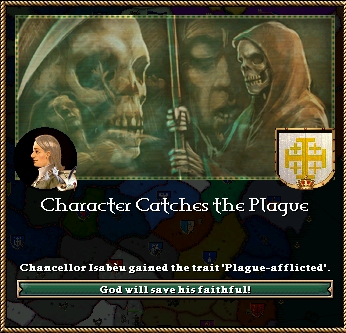
She gave birth, however, to a healthy daughter. In fact, amazingly, King Martin did not let the fact that his wife was depressed and covered in plague sores dissuade him from his marital bed! He needed an heir, did he not?
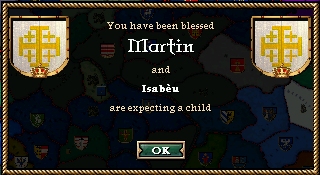
During her pregnancy, a miracle worker came to Jerusalem, prayed over Queen Isabeu, and healed her! In April of 1416 she gave birth to a healthy boy, Philip. Truly God watched over the royal family.
After the birth of young Prince Philip, several of the leading Dukes of the Kingdom came before King Martin II angling for more personal power. Martin rejected their proposals on no uncertain terms.
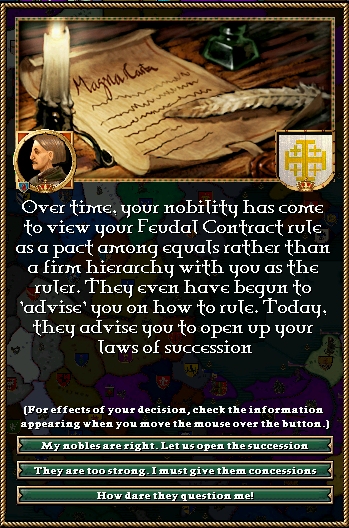
In order to distract them from their grievances, Martin planed a short campaign against the Greek Muslims of Azerbaijan, claiming it was to avenge his father's defeat. In the summer of 1420, he attacked.
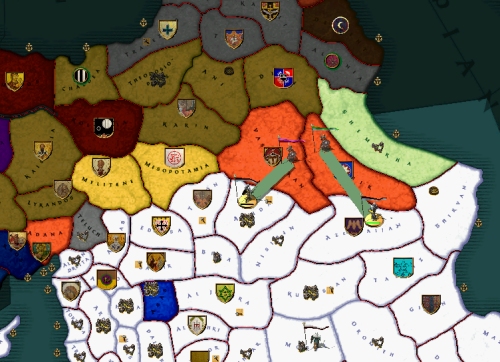
Many in Europe saw this as the last great Crusade against the Muslims. Tiny and pitiful as Azerbaijan was, it was the last significant and independent Islamic power in Europe. Small bands of knights, wanting to say they had participated in the final triumph of Christ came from afar to offer their services to Jerusalem.

It was a very short war.
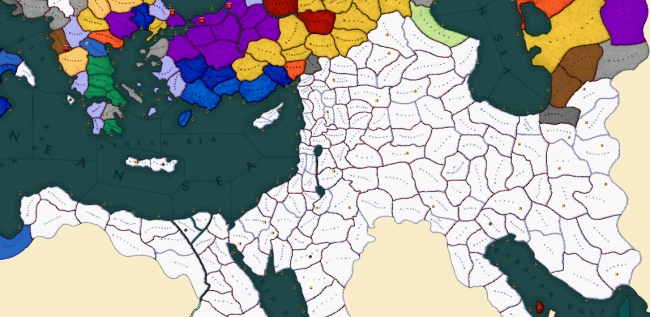
More sad news from Byzantium came in 1421. Constantinople had fallen and been seized by the Principality of the Moldavians, an ally of Rum. Over the next few years Rum continued to grow bigger and bigger, sweeping up the old Byzantine vassals and creating an new empire ruled from the northern reaches of Russia.
(Rum in yellow, Moldavia in pale blue (except for Baltic coast, that's Lithuania.)
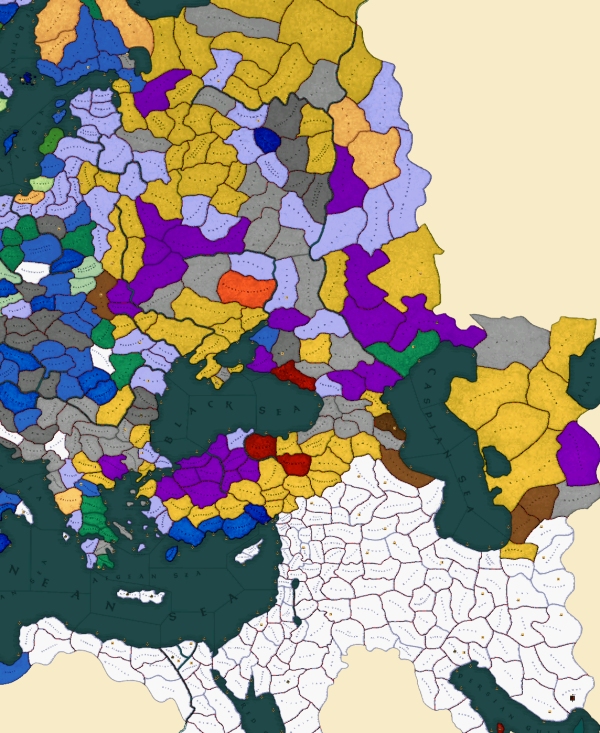
The King of the Rum:
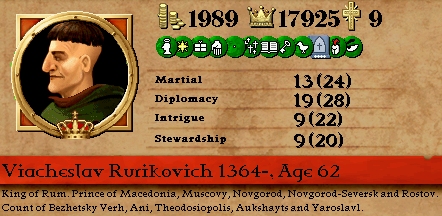
In time, the Byzantines would retake their capital, but the Empire had been terribly crippled.
Tragedy struck Jerusalem not long after the news of Constantinople's fall. Young Prince Philip sickened, lingered for a short while, and then died.
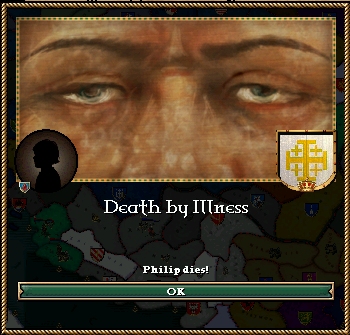
In the east, devastated first by Mongols and then again by plague, the city of Baghdad finally became more a Crusader city then an Arab one. A memorial was built in honor of King Baldwin V and his son King Conradin, both of whom had died fighting for a Christian Baghdad.

After Prince Philip died, the light seemed to leave King Martin II. He ruled for some years, but it was clear his heart was not in it. No son of his would ever rule Jerusalem.
In November of 1428, Martin II fell ill.
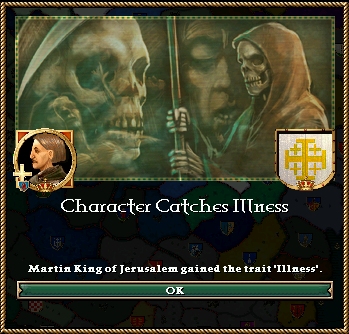
He died just over a year later, in the spring of 1430.
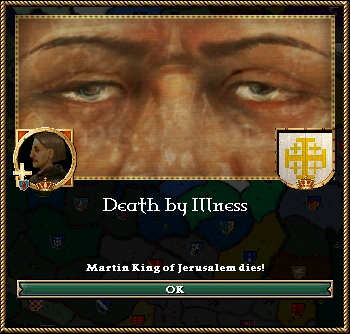
He was succeeded on the throne by his cousin, Baldwin, who was descended from the Dukes of Alexandria and Baldwin IV's son Gauthier.
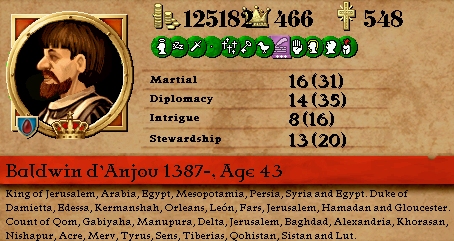
Baldwin VII was faced mostly by internal problems during his short reign. He prevented his steward from bullying the peasants, shortly after taking his crown.

More interestingly, one of his advisors was accused of committing heinous acts of black magic.

Despite the blood lust of many in Jerusalem, King Baldwin did not throw his advisor to the Inquisition. He prided himself on his fairness, and made certain that a just trial was held. Unfortunately, the man was found guilty and burned at the stake.
In 1437, after just seven years on the throne, Baldwin VII died of old age.

His eldest son, Laurence, took the throne next.
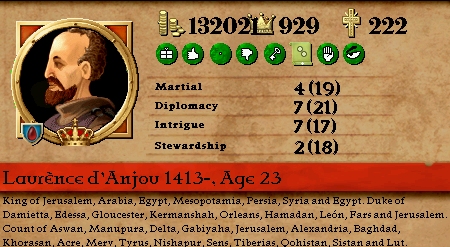
The world was changing.
Travelers claimed that the last of the Shahs of the Khwarizmian Turks had converted from Islam to Catholicism before being absorbed by the growing power of the Russian Rum. The terrible threat of Islam to Europe was already becoming myth and fairy tale. A story from the days of the birth of the Kingdom of Jerusalem nearly three hundred and fifty years before.
In the west, news came that the Kingdoms of Portugal and Leon were sailing their fragile little ships down the African coast, seeking new routes to the wealth of the Orient. They sought the spices, silks, and fine goods that had for so long flowed along the Silk Road. Jerusalem had sat on these trade routes for many years, and profited by them, but perhaps that source of wealth would not last much longer.
Scottish Kings had grown to dominate the British Isles and Western France. They claimed, indeed, to have inherited the Crown of France, and the right to rule that rich land. Would Scotland be able to subdue the riotous and strongly independent French dukes and the weakened nation of England on their own isle?
The Pope had proven his temporal power, subduing most of the Italian peninsula under his rule. A rival, perhaps, for the true Kingdom of God on Earth.
Surprisingly Pagan Lithuania and Finland still flourished and had made strong inroads against Catholic Sweden. It was likely, however, that the mighty Russian Rum would bring them Christ. After all, the Moldavians had recently sworn fealty to the Kings of Rum, creating a Kingdom of Rum that nearly rivaled Byzantium at its height.
Across Europe trade was increasing. New ideas were flourishing. Bit by bit, the darkness of the Middle Ages was lifting. From alchemist's laboratories came the stench of crude gunpowder.
Jerusalem's era of tranquility was drawing to a close...
In the summer of 1448, King Laurence sponsored a Miracle Play in honor of the Kingdom's own brave Saint Louis.

King Laurence watched the actors go through their parts. He watched Saint Louis the Great strike down the Muslim and the Mongol. He watched the miraculous healings, the Signs in the Heavens.
When the curtain fell, at last, on the Miracle Play of Saint Louis of Jerusalem, King Laurence felt a strange chill. It was as though more then a play had ended. It was as though a great Age had come to a close.
Nothing would ever be the same again…


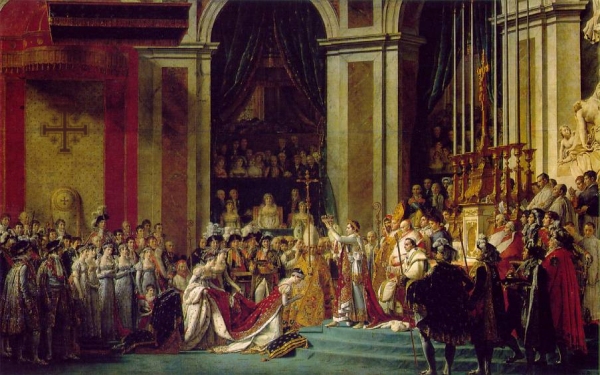
THE END
OF THE CHRONICLES
OF THE KINGDOM OF JERUSALEM
IN THE AGE OF CRUSADER KINGS
THE BEGINNING
OF THE CHRONICLES
OF THE KINGDOM OF JERUSALEM
IN THE AGE OF THE RENAISSANCE
AND EUROPA UNIVERSALIS